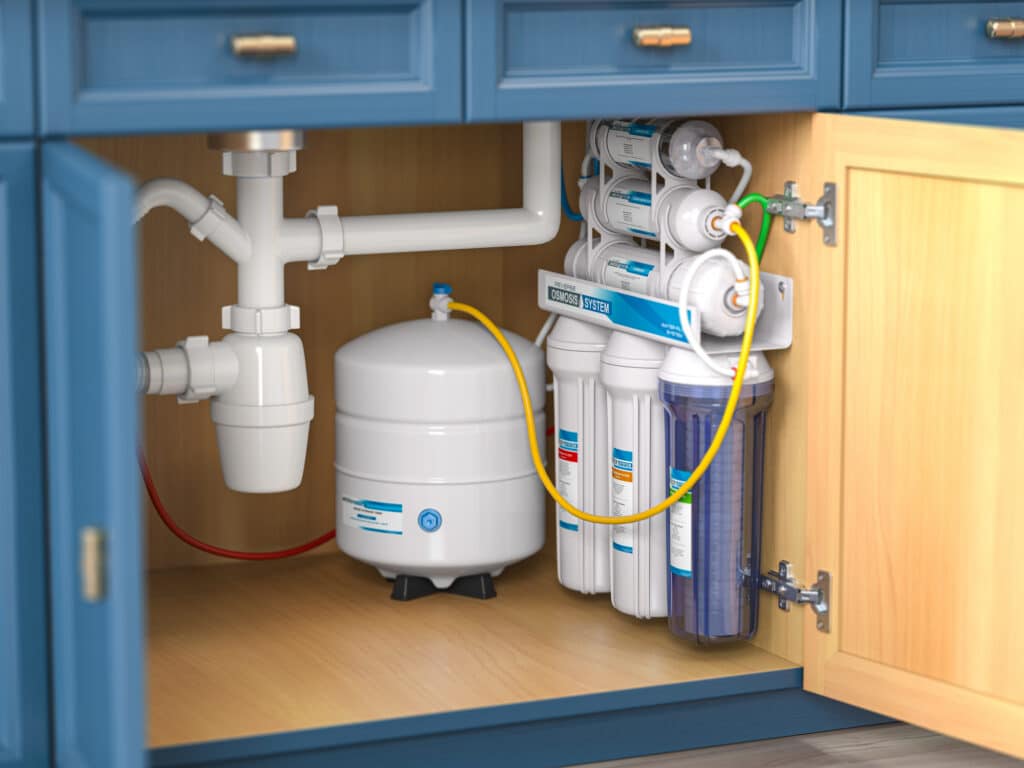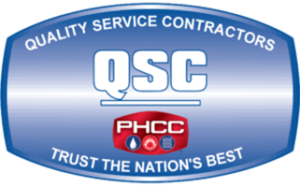Advanced filtration systems significantly improve water quality by removing harmful contaminants such as chlorine, lead, bacteria, and heavy metals. These systems go beyond basic filters, using technologies like reverse osmosis, carbon block, UV, and ion exchange to provide clean, safe, and better-tasting water. Depending on your needs, they can be installed to filter all water in your home or at specific points of use, making them a great investment for healthier water.

Have you ever wondered what’s really in your water? Whether it’s the water you drink or use every day, its quality can have a big impact on your health and comfort.
Unfortunately, many of us don’t think twice about it until something goes wrong. But here’s the good news: filtration systems can make a world of difference.
They’re designed to remove harmful contaminants, making your water safer, cleaner, and even tastier. Ready to learn how these systems can improve your water quality? Let’s get started!
Understanding Water Quality
What Is Water Quality?
Water quality refers to the condition of the water and how suitable it is for various uses, like drinking, bathing, and cooking. Good water quality means your water is free from harmful contaminants and is safe to use in your home.
Poor water quality, on the other hand, could mean the water has harmful chemicals, bacteria, or heavy metals that could pose health risks. So, having a good understanding of your water’s quality is essential to keeping your home safe and your family healthy.
Common Water Contaminants
When it comes to water, not all contaminants are created equal. Some common contaminants include:
- Chlorine: Often added to public water supplies to kill bacteria, but it can affect the taste and smell of your water.
- Lead: A dangerous heavy metal that can leach into water from old pipes.
- Bacteria and Viruses: These can cause a range of health problems if not properly filtered out.
- Nitrates: Often found in water sources near agricultural areas, they can be harmful, especially to infants.
Knowing what’s in your water is the first step to ensuring it’s safe for you and your family. Understanding water quality can help you make informed decisions about the water in your home.
What Are Advanced Filtration Systems?
Advanced filtration systems are designed to remove a wide range of contaminants from your water, including chemicals, heavy metals, bacteria, and other impurities. These systems go beyond basic water filters by using more sophisticated technology to ensure that your water is as clean and pure as possible.
Whether you’re concerned about the taste of your water, the presence of harmful substances, or just want peace of mind, an advanced filtration system can be a great investment.
These systems can be installed in different ways, depending on your needs. Some are connected directly to your main water line to filter all the water that enters your home, while others are designed to filter water at specific points of use, like your kitchen sink. No matter the setup, the goal is the same: to provide you with the best possible water quality.
Types of Advanced Filtration Systems
Now that you know what advanced filtration systems are, let’s dive into the different types available. Each type of system has its own unique way of purifying water, and understanding these options will help you choose the best one for your home.
Reverse Osmosis Systems
Reverse osmosis (RO) systems are one of the most popular types of advanced filtration. They work by pushing water through a semi-permeable membrane, which traps contaminants like heavy metals, chemicals, and even microorganisms.
Clean, crisp water that’s free from most impurities. RO systems are especially good at removing things like lead, chlorine, and fluoride, making them a favorite for those looking to improve both taste and safety.
Carbon Block Filters
Carbon block filters are another common choice for home water filtration. These filters use activated carbon, which is highly effective at trapping organic compounds, chlorine, and other chemicals that can affect the taste and smell of your water.
They’re also great at reducing the presence of harmful contaminants like pesticides and herbicides. The porous nature of the carbon helps to absorb these impurities, leaving you with cleaner, better-tasting water.
UV Filtration Systems
UV (ultraviolet) filtration systems are a bit different from the others because they don’t physically remove contaminants from the water. Instead, they use UV light to kill or inactivate bacteria, viruses, and other microorganisms.
This makes UV systems an excellent choice for homes concerned about waterborne pathogens. While UV systems are highly effective at disinfecting water, they are often used in combination with other filtration methods to ensure comprehensive water purification.
Ion Exchange Filters
Ion exchange filters are particularly good at dealing with hard water, which is water that contains high levels of minerals like calcium and magnesium. These filters work by exchanging the hard minerals in the water with softer ones, like sodium or potassium.
The result is water that’s gentler on your pipes, appliances, and even your skin and hair. Ion exchange is often used in water softening systems but can also be a part of a larger filtration setup.
Alkaline Water Filters
Alkaline water filters do more than just purify your water; they also raise its pH level, making it less acidic. Some people believe that alkaline water has health benefits, such as improved hydration and detoxification.
These filters work by adding minerals like calcium and magnesium back into the water, which not only increases the pH but also improves the taste. If you’re looking for a way to boost your water’s quality and potential health benefits, an alkaline water filter might be worth considering.
Benefits of Using Advanced Filtration Systems
Now that we’ve covered the types of advanced filtration systems, let’s talk about why you might want to invest in one. These systems offer several significant benefits that can improve the quality of your water and, in turn, your quality of life.
Improved Taste and Odor
One of the first things you’ll notice after installing an advanced filtration system is the improvement in your water’s taste and smell. Many contaminants, like chlorine and sulfur, can give water an unpleasant taste or odor.
Filtration systems, especially carbon block filters, are excellent at removing these impurities, leaving you with water that’s not only safe but also enjoyable to drink.
Removal of Harmful Contaminants
Safety is a top priority when it comes to the water in your home, and advanced filtration systems excel at removing harmful contaminants.
Whether it’s lead, mercury, pesticides, or bacteria, these systems are designed to reduce or eliminate the presence of substances that could pose health risks.
With an advanced filtration system in place, you can have peace of mind knowing that the water you and your family are drinking is free from harmful pollutants.
Protection Against Waterborne Diseases
Waterborne diseases, caused by bacteria, viruses, and parasites, can be a serious concern, especially in areas where the water supply may be compromised.
UV filtration systems, in particular, are highly effective at neutralizing these microorganisms, providing an additional layer of protection against illnesses. By investing in a system that targets these pathogens, you’re taking a proactive step in safeguarding your family’s health.
Better Hydration
When water tastes better, you’re more likely to drink it. Proper hydration is essential for overall health, and having clean, great-tasting water readily available can encourage you and your family to drink more of it.
Additionally, some systems, like alkaline water filters, may enhance hydration by altering the pH balance of the water, making it more beneficial for your body.
How Advanced Filtration Enhances Water Quality
Advanced filtration systems do more than just make your water taste better—they play a crucial role in enhancing overall water quality by tackling a wide range of contaminants. Let’s explore how these systems work to keep your water clean and safe.
Filtering Out Chemical Contaminants
Chemical contaminants, such as chlorine, pesticides, and industrial solvents, can make their way into your water supply from various sources. Advanced filtration systems, particularly carbon block filters and reverse osmosis systems, are highly effective at removing these chemicals.
By trapping and eliminating these unwanted substances, these systems ensure that your water is not only safe to drink but also free from the unpleasant tastes and odors that chemicals can cause.
Removing Heavy Metals
Heavy metals like lead, mercury, and arsenic are among the most dangerous contaminants that can be found in water. They can leach into water supplies from old pipes or industrial waste, posing serious health risks if consumed over time.
Advanced filtration systems, especially reverse osmosis and ion exchange filters, are specifically designed to target and remove these harmful metals. By doing so, they significantly reduce the potential for long-term health issues associated with heavy metal exposure.
Eliminating Microbial Threats
Microbial threats, including bacteria, viruses, and parasites, are another major concern when it comes to water safety. UV filtration systems are particularly effective at addressing these threats. By using ultraviolet light to kill or deactivate harmful microorganisms, these systems provide a powerful defense against waterborne diseases.
When combined with other filtration methods, UV systems help ensure that your water is not only free from physical and chemical contaminants but also safe from biological ones.
How to Choose the Right Filtration System for Your Home
With so many options available, choosing the right filtration system for your home can feel overwhelming. However, by considering a few key factors, you can make an informed decision that meets your needs and ensures you get the best water quality possible.
Assessing Your Water Quality Needs
The first step in choosing the right filtration system is understanding what’s in your water. You can start by having your water tested to identify any specific contaminants you need to address.
For instance, if your water has high levels of chlorine or heavy metals, you might prioritize a system that excels at removing those substances. Knowing your water’s problem areas will help you select a filtration system tailored to your home’s unique needs.
Considering Maintenance and Cost
While advanced filtration systems offer great benefits, they also come with maintenance requirements. Some systems, like reverse osmosis, may require regular filter changes, while others, like UV systems, might need periodic bulb replacements.
It’s essential to consider how much maintenance you’re willing to handle and the associated costs. Additionally, the initial price of the system should fit within your budget, but remember to also factor in the long-term costs of maintaining it.
Installation Requirements
Another important consideration is the installation process. Some filtration systems, like under-sink models or whole-house systems, require professional installation, which could add to the overall cost.
Others, like countertop filters, are simpler and can often be installed without professional help. Think about your comfort level with installation tasks and whether you’d prefer to do it yourself or hire a professional.
The Importance of Regular Maintenance
Once you’ve chosen and installed the right filtration system for your home, it’s important to keep it running smoothly. Regular maintenance is key to ensuring your system continues to provide clean, safe water. Here’s what you need to know about maintaining your filtration system.
How Often to Replace Filters
One of the most crucial aspects of maintaining your filtration system is replacing the filters regularly. Different systems and filter types have varying lifespans, but as a general rule, most filters need to be replaced every 6 to 12 months.
Some systems, like reverse osmosis units, may have multiple filters, each with its own replacement schedule. Regularly changing your filters ensures that your system is working at peak efficiency and effectively removing contaminants from your water.
Signs Your Filtration System Needs Attention
Even with regular filter changes, your system may occasionally need extra attention. Watch out for signs that your filtration system might not be functioning properly.
These signs can include a noticeable drop in water pressure, changes in the taste or smell of your water, or unusual noises coming from the system.
If you notice any of these issues, it’s important to inspect your system and, if necessary, consult a professional to ensure everything is in working order.
Professional vs. DIY Maintenance
When it comes to maintaining your filtration system, you might wonder whether to handle it yourself or hire a professional. For simple tasks like replacing filters or cleaning parts, DIY maintenance can be a cost-effective and straightforward option.
However, for more complex systems, such as whole-house filtration units or those with advanced technology like UV filters, it might be wise to schedule professional maintenance.
Professionals can ensure that everything is installed correctly, and functioning properly, and they can address any issues you might not be equipped to handle on your own.
Environmental Impact of Filtration Systems
While advanced filtration systems are excellent for improving water quality, it’s also important to consider their environmental impact. The good news is that many modern systems are designed with eco-friendliness in mind. Let’s explore how these systems contribute to a healthier environment.
Reducing Plastic Waste
One of the biggest environmental benefits of using a home filtration system is the reduction of plastic waste. By filtering your own water at home, you can significantly cut down on the number of plastic bottles you use.
This not only saves money but also helps reduce the amount of plastic waste that ends up in landfills and oceans. Over time, switching from bottled water to a home filtration system can have a considerable positive impact on the environment.
Energy Efficiency of Advanced Systems
Many advanced filtration systems are designed to be energy-efficient, which is another plus for the environment. For example, UV filtration systems use minimal energy while providing effective disinfection.
Similarly, modern reverse osmosis systems often include energy-saving features, such as more efficient water use and lower operating costs. Choosing an energy-efficient system not only reduces your carbon footprint but can also lower your utility bills.
Ready for Cleaner, Safer Water in Clarksburg, Gaithersburg, or Bethesda?
Don’t settle for anything less than the best when it comes to your water quality. Clarksburg Plumbing is here to help you choose and install the perfect filtration system for your home.
Whether you’re in Clarksburg, Gaithersburg, or Bethesda, we’ll ensure your water is pure, safe, and refreshing. Contact us today to start enjoying better water!

FAQs About Filtration Systems
Do Filtration Systems Remove Fluoride?
Yes, certain filtration options, such as reverse osmosis, are highly effective at removing fluoride from water. However, not every system can do this, so if fluoride removal is important to you, be sure to choose one specifically designed for that purpose.
How Long Do Filters Last?
The lifespan of a filter depends on the type of system and the quality of your water. Most need to be replaced every 6 to 12 months, but some may last longer or require more frequent changes. Always check the manufacturer’s recommendations for your specific setup.
Can Filtration Systems Work with Well Water?
Yes, many advanced water filtration options can be used with well water. In fact, they can be particularly beneficial for well water users, as it can contain higher levels of contaminants like bacteria, heavy metals, and nitrates. It’s important to have your well water tested and choose a system that addresses its specific issues.
Are Filtration Systems Expensive to Maintain?
The cost of maintenance varies depending on the type of system you choose. Some have low maintenance costs, while others, like reverse osmosis units, might require more frequent filter changes and upkeep. However, the cost is generally outweighed by the benefits of having clean, safe water in your home.
Do Filtration Systems Remove Essential Minerals?
Certain filtration methods, like reverse osmosis, do remove both harmful contaminants and beneficial minerals from water. However, some, such as alkaline filters, are designed to add essential minerals back into the water after purification.









